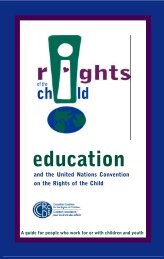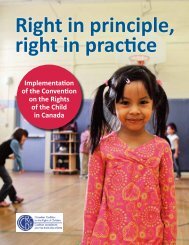Poste - Canadian Coalition for the Rights of Children
Poste - Canadian Coalition for the Rights of Children
Poste - Canadian Coalition for the Rights of Children
Create successful ePaper yourself
Turn your PDF publications into a flip-book with our unique Google optimized e-Paper software.
Promoting <strong>the</strong> Freedoms<br />
C A N A D I A N C O A L I T I O N F O R T H E R I G H T S O F C H I L D R E N<br />
Young people must know and understand <strong>the</strong>ir rights <strong>for</strong><br />
it is not sufficient <strong>for</strong> <strong>the</strong>m to assume that adults will<br />
always be <strong>the</strong>re to protect <strong>the</strong>m. Recently in a high<br />
school in Ontario, 19 Grade 9 boys were strip searched<br />
after $90 was reported missing from a classmate’s gym<br />
bag. According to one <strong>of</strong> <strong>the</strong> students, <strong>the</strong> vice-principal<br />
and <strong>the</strong> gym teacher “made us go into <strong>the</strong> phys ed <strong>of</strong>fice<br />
one at a time and we had to take our clo<strong>the</strong>s <strong>of</strong>f in front<br />
<strong>of</strong> <strong>the</strong>m.... I was embarrassed. They told me to bend over<br />
but I just crouched. It was kind <strong>of</strong> frightening.” 66 While<br />
<strong>the</strong> actions <strong>of</strong> <strong>the</strong> vice-principal and teacher were widely<br />
criticized, it is evident that <strong>the</strong>re is confusion about<br />
students’ rights. Some students refused to obey <strong>the</strong><br />
teachers and several hundred left <strong>the</strong> school <strong>for</strong> an hour<br />
at lunch time in protest; however, 19 students followed<br />
<strong>the</strong> orders <strong>of</strong> <strong>the</strong> adults.<br />
The school system, while <strong>of</strong>fering <strong>the</strong> greatest<br />
opportunity <strong>for</strong> young people to learn about <strong>the</strong>ir rights,<br />
must also respect <strong>the</strong> rights <strong>of</strong> students.<br />
Schools<br />
Generally, <strong>Canadian</strong> students learn about rights and<br />
responsibilities through <strong>the</strong> social studies curriculum <strong>of</strong><br />
<strong>the</strong>ir particular provincial department <strong>of</strong> education. O<strong>the</strong>r<br />
subjects, such as legal education, health education and<br />
personal development, may deal with particular aspects<br />
<strong>of</strong> <strong>the</strong> freedoms. For example, in British Columbia,<br />
freedom <strong>of</strong> expression is dealt with in <strong>the</strong> personal<br />
development class, whereas cultural traditions and world<br />
religions are part <strong>of</strong> <strong>the</strong> social studies curriculum. In<br />
Saskatchewan, human rights are <strong>the</strong> focus <strong>of</strong> a unit <strong>of</strong><br />
study in Grade 11. The preamble <strong>of</strong> <strong>the</strong> Newfoundland<br />
Multicultural Education Policy states that: “Education<br />
shall be directed to <strong>the</strong> full development <strong>of</strong> <strong>the</strong> human<br />
personality and to <strong>the</strong> streng<strong>the</strong>ning <strong>of</strong> respect <strong>for</strong> human<br />
rights and fundamental freedoms.” 67<br />
Outcomes are established to ensure that, by <strong>the</strong> end <strong>of</strong> a<br />
particular course, students can demonstrate specific skills<br />
or knowledge. In Prince Edward Island, <strong>for</strong> example, <strong>the</strong><br />
social studies curriculum requires that students be able to<br />
“speak, listen, read, view, think, write, dramatize, and<br />
articulate <strong>the</strong>ir thoughts.” Graduates are expected to be<br />
able to “reflect on and express <strong>the</strong>ir own ideas, learnings,<br />
perceptions and feelings.” 68 Under new (1998)<br />
curriculum in Ontario, students in Grade 5 must<br />
demonstrate an understanding <strong>of</strong> <strong>the</strong> rights <strong>of</strong> <strong>Canadian</strong>s,<br />
36<br />
Voices<br />
<strong>Coalition</strong> Questionnaire:<br />
I wanted to book an appointment with <strong>the</strong><br />
principal so I went to his secretary. The<br />
secretary was typing and she asked me to<br />
hold on a moment. The moment turned into<br />
20 minutes later when a police <strong>of</strong>ficer<br />
walked in and she stopped her work<br />
immediately to serve him. She treated me<br />
like I was so insignificant.<br />
— Stacy, aged 16, Ontario<br />
including those specified in <strong>the</strong> <strong>Canadian</strong> Charter <strong>of</strong><br />
<strong>Rights</strong> and Freedoms, and demonstrate an understanding<br />
that <strong>for</strong> every right, <strong>the</strong>re is a responsibility.<br />
Human <strong>Rights</strong> Commission, Advocates and<br />
Ombudsmen<br />
The extent to which human rights commissioners,<br />
advocates and ombudsmen promote <strong>the</strong> freedoms varies<br />
from province to province. Among <strong>the</strong> commissions that<br />
responded to our questionnaire, six prepare educational<br />
materials and conduct programs <strong>for</strong> young people on<br />
various human rights <strong>the</strong>mes while two do not, unless<br />
specifically asked to do so.<br />
The Manitoba Human <strong>Rights</strong> Commission has designed<br />
human rights workshops and developed a human rights<br />
manual <strong>for</strong> administrators, principals, guidance<br />
counselors, parents, and students. This manual provides<br />
an overview <strong>of</strong> human rights and has a checklist <strong>for</strong><br />
administrators and students to assess <strong>the</strong> extent to which<br />
<strong>the</strong> fundamental freedoms are reflected in <strong>the</strong>ir school<br />
climate. 69 As part <strong>of</strong> its activities to commemorate <strong>the</strong><br />
fiftieth anniversary <strong>of</strong> <strong>the</strong> Universal Declaration <strong>of</strong><br />
Human <strong>Rights</strong>, <strong>the</strong> Manitoba Human <strong>Rights</strong> Commission<br />
held a competition in three Manitoba schools. Students<br />
were invited to design a sticker with a human rights<br />
<strong>the</strong>me. Stickers in English, French and Michif (<strong>the</strong> Métis<br />
language) were selected and will be used in o<strong>the</strong>r<br />
educational programs.<br />
In Quebec, <strong>the</strong> Human <strong>Rights</strong> Commissioner and <strong>the</strong><br />
child advocate are within <strong>the</strong> Human and Youth <strong>Rights</strong>




